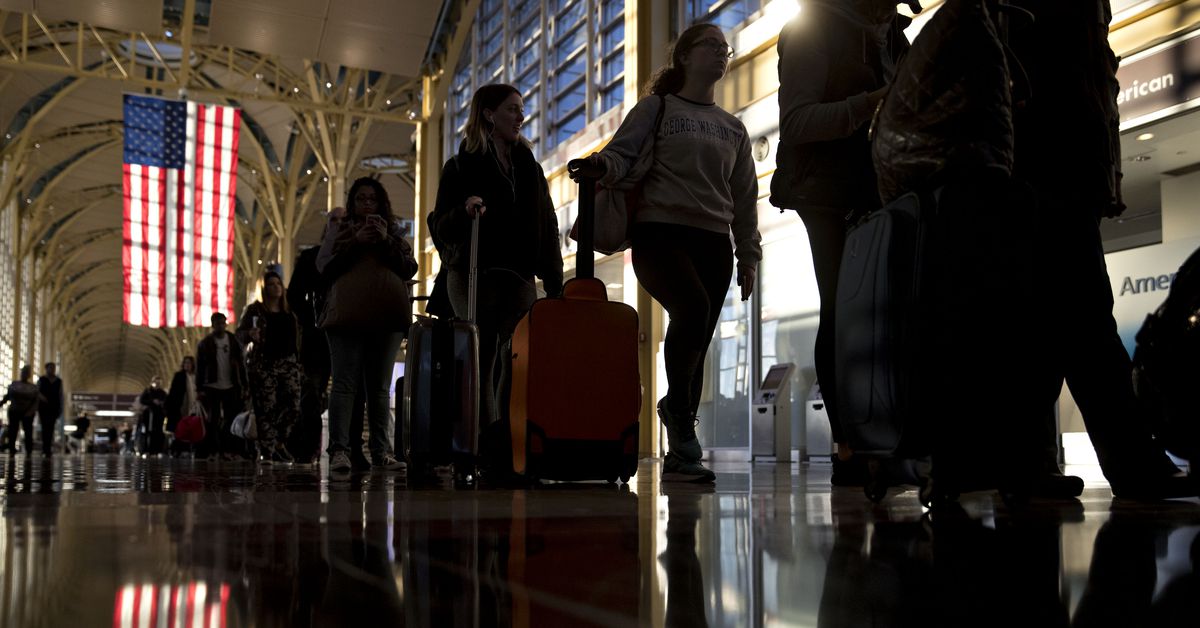
With the country continually in mourning over gun violence — we keep seeing mass shooting after mass shooting after mass shooting — it’s time to find ways to prevent it, lest we remain the “only nation where this regularly happens.” Those solutions needn’t be new, and could perhaps be kind of banal, like the risk-based decision-making behind TSA PreCheck screenings.
The Transportation Security Administration introduced TSA PreCheck in response to September 11 to prevent future terror attacks on airplanes. The system has a dual mission: expediting travel for people who submit to enhanced background checks and making everyone safer by allowing the government to focus on people who are considered risky or whose risk is unknown.
To qualify for TSA PreCheck, passengers undergo a screening process that determines whether or not they’re a risk. The process requires a questionnaire about biographical information and criminal history, fingerprints, and an in-person interview (exactly what’s involved in those background checks is classified). If approved, a so-called known traveler faces fewer security checks than everyone else. And by some measures, this system has been very effective. Experts say air travel has become safer even as threats have continued to evolve, partly since PreCheck allows the TSA to focus its attention on higher-risk travelers.
As it considers a raft of new gun control legislation, Congress could learn a thing or two from TSA PreCheck. First off, a similar system for guns would require, at a base level, that everyone go through a federally standardized background check to get a gun, much like everyone has to go through airport security to fly. This would improve on the current state of background checks for guns, in which loopholes allow people to buy guns from private sellers or online without any type of background check. Gun laws also vary widely from state to state, which leads to a flow of weapons from less-strict states to stricter ones. Universal background checks are very popular on both sides of the aisle and even among gun owners.
PreCheck-inspired background checks for guns could also be more thorough and use a wider array of signals than existing background checks for guns, which typically look at just criminal records, institutionalization, and drug use. For example, the Buffalo shooter obtained his gun legally because he didn’t have a criminal record. A system that took into consideration more factors — his young age, the type of weapon he wanted to buy, and the amount of ammunition he requested — could have flagged him as a danger.
It’s also worth pointing out that travelers who have gone through the TSA PreCheck screening only need to do so once every five years. Adopting such a system for guns could mean that once gun owners are deemed safe, they can make purchases unencumbered — as long as they don’t do anything to nullify the approval — while the government directs its attention to those more likely to commit violent crimes.
Sheldon H. Jacobson, a computer science professor at the University of Illinois Urbana-Champaign whose research was foundational for creating the TSA PreCheck system, thinks lawmakers could employ similar risk-based decision-making to counter the scourge of gun violence in this country. Using a variety of signals to determine who might be a risk for causing gun violence in the first place, authorities could better match resources with risk.
In a recent interview with Recode, Jacobson pointed out that millions of Americans have submitted themselves to background checks to get TSA PreCheck membership. They even do it for loans. Why are guns any different?
Our conversation has been edited for length and clarity.
Rani Molla
How did TSA PreCheck come about?
Sheldon H. Jacobson
The first thing that people realized after September 11 is we can’t treat everybody like a terrorist. We don’t have the money. We don’t have the time. We don’t have the resources. And we batted around that we would do differential screening, but the question was: How do you sell that to Congress? How do you sell it to the people that we would treat people differently? Will it work?
Basically, our research group undertook that problem. We did a proof of concept to establish that differential screening, if done appropriately, will actually result in more security and benefit to everybody, including the people who are of unknown risk. We made a presentation to the TSA in 2003 on this, and they accepted what we said. They basically ran it up the flagpole to get the salutes from the appropriate people in Congress to approve it. And then PreCheck started in 2011.
You see that in recent events, that each of them has its own unique characteristics. And you may say, “Well, the 18-year-old in Uvalde, he had just picked up the gun a few days before, and really his background — except that he was young and inexperienced — would not have indicated very many red flags.” On the other hand, his youth would have been a possible red flag as would his stated need for a firearm, the need for the type of ammunition, and the volume of ammunition that he was requesting.
All of these are layers that, when you put them together, I believe will amount to very airtight protection. But it also means that there will be obstacles for people to access weapons. There will be obstacles for people to access ammunition, and there may be delays. And some people will then argue that’s not fair, that’s not constitutional. But the reality is we’re going to have to make compromises to create these layers if we want the layers to be effective. If we want them to continue to not be effective, then we will continue to argue and not be able to get anything done.
Rani Molla
As many have noted, every time something this horrible happens — after Sandy Hook, for example — people assume that laws will change. But as you said, it seems like all Americans have done is argue, and that’s done very little to stop mass shootings in the US. How can we make sure something positive happens after Uvalde?
Sheldon H. Jacobson
We can find some common ground if we focus on what we’re trying to achieve, as opposed to the how. Let’s work on the how second. First, let’s find out what our objectives are. The objective is to reduce the number of preventable and premature deaths due to firearms. Very simple statement, and I believe everybody can agree with that objective. I can’t imagine anybody saying, “Oh, I can’t agree with that.”
Rani Molla
Right, but the how part is a bit of a sticking point.
Sheldon H. Jacobson
The how is the challenge. That’s why when you introduce layers, each layer may in fact be acceptable to some people. But it’s when you put them together that you get the impenetrable fortress that will reduce premature and preventable deaths.
Rani Molla
For guns, what does that look like? A lot more monitoring of who’s buying ammo and guns and their age and their background?
Sheldon H. Jacobson
These are all the things that everybody is discussing, and that includes red flags and background checks. The thing about background checks and why they’re so important is that, once you submit yourself to a background check, you’re making a statement that you’re willing to have someone look under the covers. When the TSA vets you for PreCheck and they approve you, you become a known traveler. And in many ways, we want every single person who’s interested in purchasing a firearm to become a known firearm owner. That, itself, is a deterrent for bad behavior.
Rani Molla
Because they know that they’re known?
Sheldon H. Jacobson
Yes, because they know that they’re known. And that’s why people who have PreCheck are very well behaved in your system compared to those who don’t. This is purely anecdotal, based on my conversations with people, but I believe it’s a reasonable statement: The TSA finds close to 5,000 guns every year at checkpoints. How many of them are PreCheck versus non PreCheck? They don’t report it and it’s never going to be reported publicly, but based on all my experience — but I have known no proof of this — the vast majority are not PreCheck passengers. PreCheck passengers are going to be careful when they go through because they’re more experienced, they know how to travel, and in some sense, they’ve been informed and vetted already.
Rani Molla
While horrible, the vast majority of gun deaths in the US are not part of mass shootings, but rather suicides. Could risk assessment be used to prevent some of those as well?
Sheldon H. Jacobson
I believe that anything we do to know more about people who are owning firearms, the more likely we’re going to have beneficial impacts on the well-being of people in the country when it comes to firearm safety.
Rani Molla
You’ve noted that we regularly go through risk screenings for much more banal stuff than guns, like travel and mortgages. Why are guns different?
Sheldon H. Jacobson
The auto industry as well as the airline industry are always looking at continuous improvement of their processes. When there is an airplane accident, the National Transportation Safety Board goes in, does a root cause analysis, determines what happened, and then implements policies and procedures so that it won’t happen again on another flight. The auto industry has continued to improve automobiles in a manner that there’s more safety features built-in. And some of them have become laws and policies — safety belt use, for example. All of these industries continue improving. And you see it in the fact that there are fewer accidents and fewer deaths.
Every industry that wants to compete has to continue to improve, and government policies should be designed to improve the well-being of Americans and, ultimately, everybody who lives in the country. This is an issue that’s not seen improvement. Why aren’t we improving when everything else in our DNA says we should be improving?
Rani Molla
Again then, why is the gun industry different?
Sheldon H. Jacobson
That’s the question I keep posing. And that’s why I’ve come up with all these examples of things that we do routinely and accept. But when it comes to issues surrounding firearms, for some reason, walls go up and it’s like, “No, we can’t change.” And if we don’t change anything, we’re going to keep getting the same result.
I think people call that insanity: doing the same actions expecting different results. Well, we’re doing the same thing over and over again, and we’re getting the same results. So the question is, is this acceptable? And most of us will agree now it’s not acceptable.






